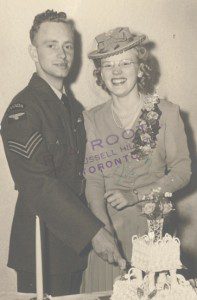There’s generally at least one of these in every neighbourhood. This person is most often extremely well grounded in the community or has lived there for years. People next door or down the block all feel they could trust this individual with their mother or their kids. I had a proxy parent like this. Only I didn’t realize I needed her as a surrogate until I was a young adult.
I knew her as “Ma Ross.”

Actually her name was Betty Ross. She was born Helen Elizabeth Watson on July 11, 1920, in Toronto. When she was four, her father died. So, she was raised by a caring brother. Betty came of age during the Second World War, fell in love with an RCAF Spitfire pilot – when they danced on terrace of the Palais Royale on a night in 1940 – and waited for her beau, Richard Ross, to come home safely from the air war overseas. In the 1950s, I met Betty through her son, David, who’d become my closest friend in elementary school in Agincourt, Ont. But that’s not when she became my fill-in mom.
Actually, I guess I use these terms incorrectly. A surrogate parent is somebody who substitutes in a reproductive arrangement. A proxy parent actually has custody of others. Betty Ross was neither. About 1968 my father, who had written scripts for television and radio for years in Canada, joined the migration of Canadian TV talent to California; he thought he’d give Hollywood a try and took my mother and sister with him. I was 19 then and eligible for the draft if I wasn’t in school.
“I don’t think you look particularly handsome in a U.S. Army uniform,” my father said, mindful that young people were being drafted for the Vietnam War by the tens of thousands. “So, I think you should stay back in Canada.”
I agreed. But I was already enrolled in broadcasting courses at Ryerson Polytechnical Institute, living in an apartment with Betty’s son Dave, and figured I should go it alone anyway. I had my studies, my friends, my writing to keep me busy and to help me exercise my independence. All well and good, until I suddenly found myself short of cash for groceries, lacking a clean set of clothes because I hadn’t kept up with my dirty laundry, and was unable to go to my mom for a home-cooked meal.
“You just come along home with Dave,” Ma Ross told me.
In addition to my limited grocery money, dirty laundry and an empty stomach that weekend, she knew I was pretty homesick. She recognized that her two natural sons were busy chasing education and careers. And I seemed to blend in. So almost immediately, Ma Ross incorporated me into her suburban household whenever I chose to join it.
In fact, she quickly began referring to me as her “Number Three Son.” But even when I had left those post-secondary education days behind, Ma Ross maintained a continuing interest in my life, my activities and (if it needed assistance) my occasionally bruised ego.
My sense is that many men and women in North American communities readily take on such fill-in roles. I guess that’s the genesis of such organizations as Big Brothers, Big Sisters and even the Neighbourhood Watch program. It’s not because natural parents don’t care about their kids. It’s only because even the best parent-child relationships experience gaps… gaps that only a nearby tuned-in adult recognizes and knows how to bridge.
It’s hindsight that tells me that Betty Ross’s fatherless childhood, her wartime deprivation and her experience raising two post-war sons, gave her the intuitive capability to recognize the periodic needs of her proxy son. I think I’m a better person for her periodic invitations into the Ross family.
 Ma Ross died last week (at age 93) and this past Monday afternoon, her family – two sons, two daughters-in-law, four grandsons and two-and-a-half great granddaughters – assembled to celebrate her life. I was invited to share my thoughts and memories. In particular, I remembered that time as a 19-year-old in 1968, when I had suddenly felt alone, adrift and out-of-touch. That’s when she stepped up and invited me into her family. I’ve never forgotten that gift. It came at a time I needed the boost and stability.
Ma Ross died last week (at age 93) and this past Monday afternoon, her family – two sons, two daughters-in-law, four grandsons and two-and-a-half great granddaughters – assembled to celebrate her life. I was invited to share my thoughts and memories. In particular, I remembered that time as a 19-year-old in 1968, when I had suddenly felt alone, adrift and out-of-touch. That’s when she stepped up and invited me into her family. I’ve never forgotten that gift. It came at a time I needed the boost and stability.
I could itemize a million things that remind me of Ma Ross. Her infectious laugh, her welcoming household, the extra-large clothes washer she allowed me to use, and her famous Sunday pot-roast dinners. I always remember Betty Ross’s birthday – it was the day before mine. And I always made a point of calling or visiting her on her birthday; it was very small payback for all the attention she had shown me when I most needed it.
As I noted when I spoke at her celebration of life on Monday, now every time I extend a helping hand to someone else the way she did to me, I’ll be thinking of Ma Ross and realizing I learned that charity from her.
Hi Ted,
Thanks so much for this touching tribute to my grandmother. Very much appreciated.
Mike
This was a great tribute to someone special in your life. One does not need to look any further than Mrs. Ross to find a true Canadian hero. Thanks for sharing.